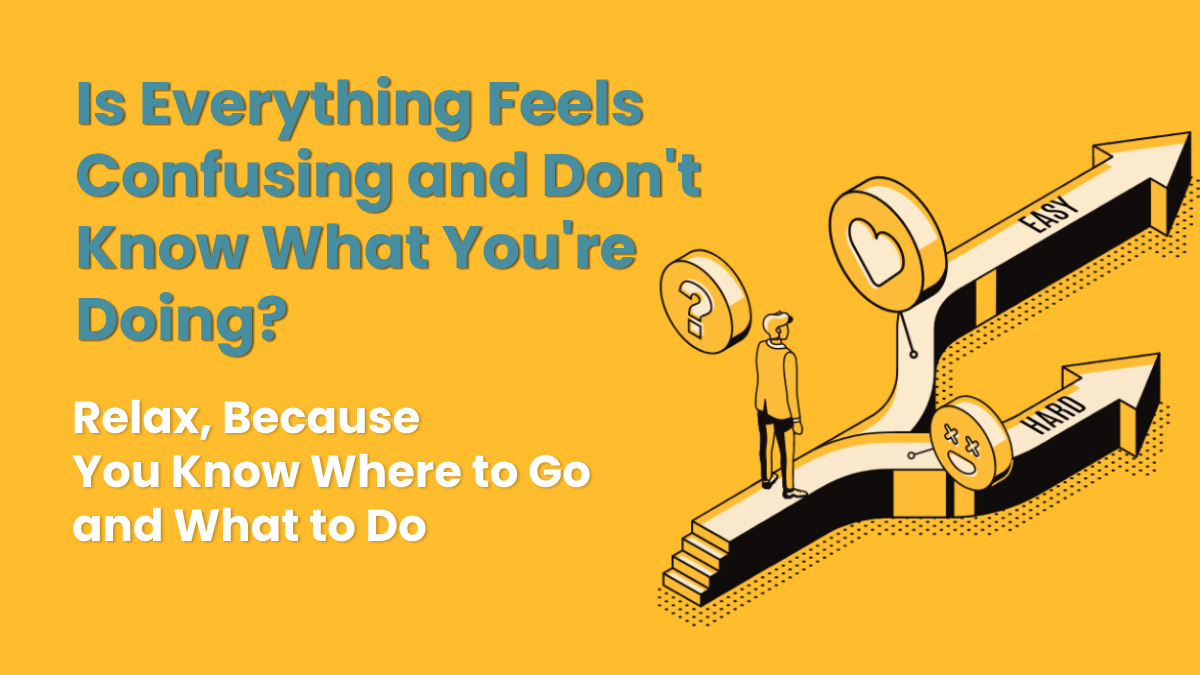Apart from social, love and family life, what’s crucial for a person to hold the ground in their life is their career.
Some favour art, so others get curious about science and technology. Some like an adventurous path, so some choose to remain under the hood.
However, despite a person’s interest and hard work, they rarely achieve what they’ve sought to achieve.
Or, in the first place, achieving something wasn’t in their picture.
All they wanted to do was simply get by. Or, perhaps, they might have no idea what they’re doing.
It feels hectic, right?
Let’s forget about those people. It’s you who want to achieve or get by, but you’ve got no idea.
People around you are succeeding, and you’re still there, where you were. Perhaps, you’ve got a job. But still, it doesn’t feel like something content – a fulfilling life.
So, in this chaotic situation, what will you do?
You’ve got no idea. And that’s true for most people. And to help them rise above this ‘no idea’ belief, Range by David Epstein- an amazing book, is here for your help.
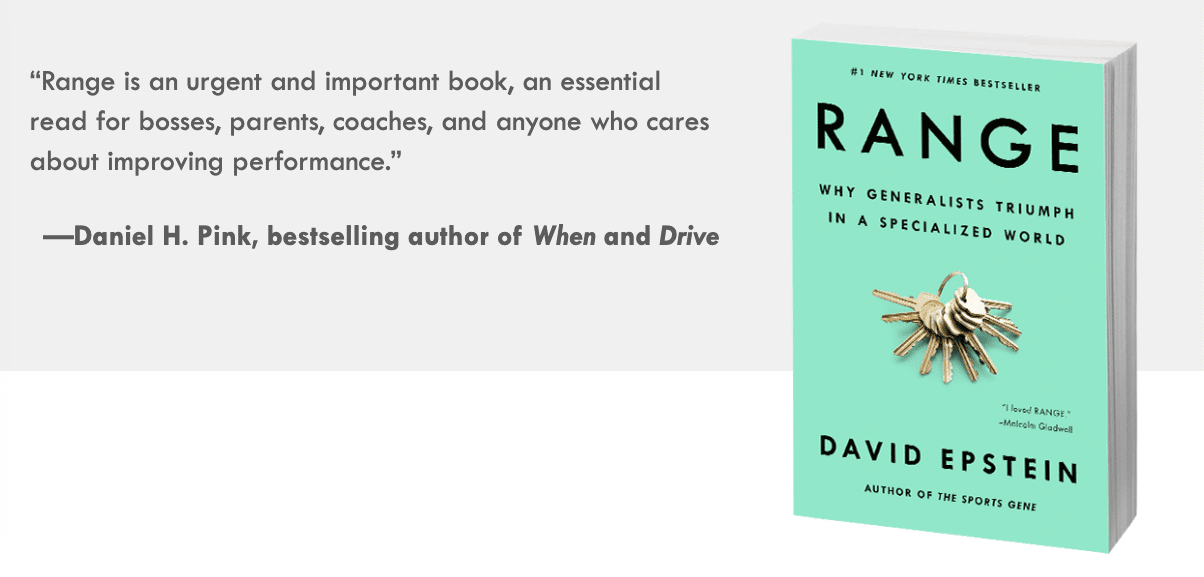
In this book, David Epstein, through different analogies of failed and successful people, tries to answer this question and opens a new way to see your opportunities, where most people give you the wrong idea.
I first heard about this book in a podcast called, Don’t Tell Me The Score by Simon Mundie, where David shares how Malcolm Gladwell unintentionally misguided people about 10,000 hours rule through his book Outliers.
You can find more about that discussion here.
One note:- I’ve read Outliers and found it amazing; however, after reading Range by David Epstein, there’s a new belief about it. Nevertheless, it’s still effective and can help people the same way Range does, but in a different way, obviously.
This article is about Range book’s summary and what I’ve learned from it. Similarly, what I’ve learned from No Rules Rules and Don’t Overthink It.
I hope you’ll enjoy this summary as much as I enjoyed the book. And now, let’s get to our Range book summary and lessons.
Range by David Epstein: Summary and 9 Lessons You Can Learn
1. The Stories We Hear About the ‘One Thing’ Aren’t Always Helpful
The book Range by David Epstein starts its argument against the favour of specialised education with the story of Roger vs Tiger.
The two most famous sportspersons are highly successful in their fields.
Tiger Woods – is one of the most successful golf players. His story – how he picked up the golf club when he was just a kid – is famous.

It reflects the notion that you should start early and stick with it to succeed.
On the other hand, Roger Federer – one of the most successful tennis players – whose story is rarely known to people – despite his success.

The story is that he never played only tennis. Instead, he played so many sports but still succeeded.
But we are only told stories that talk about “one thing” and the success that comes with it.
Why? Because parents are stubborn and don’t want to distract their children from their (parents) own desires, which they seek to be completed through the child’s efforts.
And that’s what the book Range discusses and tries to knowledge people that you don’t have to stick with one thing.
Real-World Examples
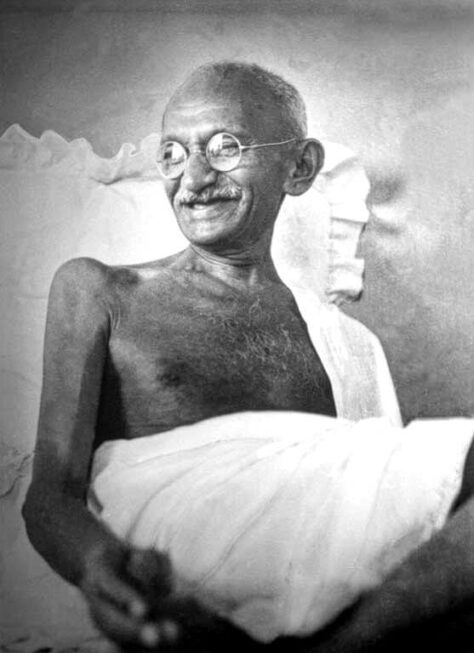
- Mahatma Gandhi – was a lawyer but successful as a freedom fighter.
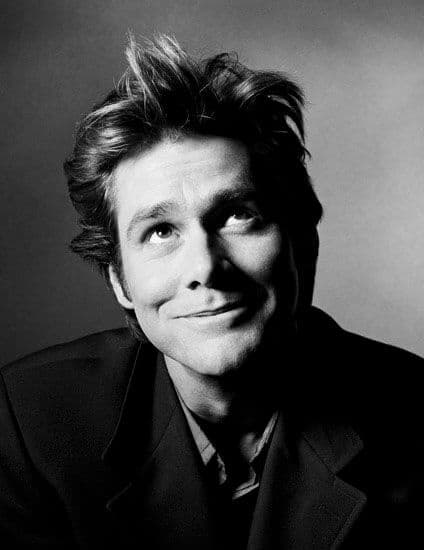
- Jim Carrey – worked as a Janitor but is successful as an Actor.
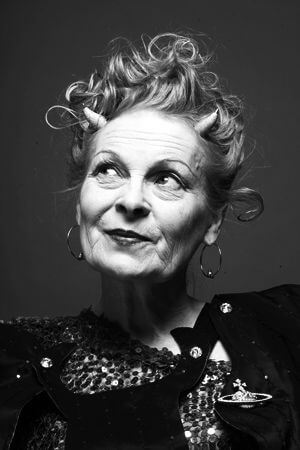
- Vivienne Westwood – was a school teacher but successful as a Fashion designer.
Also, if one thing was true, then why Andre Agassi has to say that he never liked playing “Tennis” even though he won numerous titles?
2. Head Starts Aren’t Necessary to Succeed
In the book Outliers, you would read or have how so many people did this or that at a very early age and got succeeded. Among those, the one that captures everyone’s eyes was the story of Bill Gates.

How his well-educated and successful parents got him admitted to a school where computers were available.
How he and his friends would go and hang around the computer centre at the University of Washington.
And how Bill Gates, for the love of programming, skipped athletics and enjoyed his free computer time in exchange for working on a piece of software at ISI that included long weeks and nights.
Along these, there were so many opportunities he got and due to them succeeded. Similarly, the Beatles got many opportunities at a very early stage and succeeded.
This implies that to succeed, we need an opportunity or head start at an early age.
To this implication, David Epstein, through Range, gives another implication by briefing the story of Vincent Van Gough.
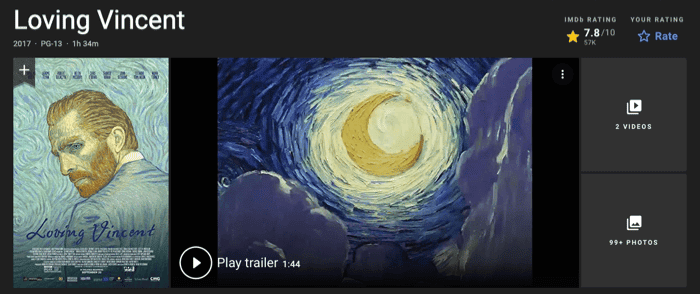
If you don’t know who Vincent was, you should watch the movie, Loving Vincent, which I watched after reading this book.
Vincent, at a very early age, got a head start as an art dealer. He even told his family that he’d never have to look back for a job with his current job. However, as an art dealer, his success was short-lived. He tried to keep up with it, but it didn’t work.
So, he tried something else but failed at them over and over.
But at the age of 28, he picked up painting which, as a child, he found restless. And later went on to be reviewed as revolutionary.
Although his success was short-lived, he didn’t succeed because of the head start or completing his 10,000 hours or sticking with one thing.
David Epstein, from his point of view, is right about head starts. But, I think that head starts aren’t bound to an early age. Instead, they can happen at any point in life.
Opportunities can occur at any point of life despite how old you are, as happened in the case of,
- Ray Kroc – at age 52, he did something that serves people delicious burgers that can only be found at McDonald’s.
- Laurel Richie – the first African American to head a national sports league. At age 52, she became the president of the WNBA.
- J.K. Rowling – well, she’s no brainer. Everyone knows about her.
If you look at the people who’re successful in a true sense, are those who crossed their age 35 or 40 like Henry Ford or even Abraham Lincoln.
3. The Pillars of Society for Success | Best Lesson in This Range Book Summary
What’s disturbing about success is that every time we sit to discuss it, people tend to rely on a few examples, mainly from Sport, Cinema/Fashion, Politics or Business.
You can count this article as well. And if you search for the top 50 successful people, you’ll find the same thing as in this Business Insider article.
Most of them are from the above-mentioned categories. Why? Because we count success from the glass of money.
To test this, try to remember a highly successful person. I’m sure you’ll find their background from the above. Or try it with someone else without telling them the categories, so they don’t play with their answer.
Anyway, the whole point of this is that life’s not only dependent on Football, Cricket or Chess.
It’s neither shaped based on how someone acts nor how good their politics is.
Instead, there are many different things where a person can succeed. The only thing that counts is how you look inside yourself.
To help you with that, you can read the following posts,
4. When Your Experience Doesn’t Help Think Outside of Experience
Whenever we face a problem in our profession, regardless of field, we tend to solve the problem with the known methods. We’re so specialised in our field that nothing else comes to mind. And there, we make the mistake.
Because sometimes a problem is altogether different, it needs a new angle to resolve itself. However, what we do is rely on your experience and the tools we’ve already got.
Thus, we couldn’t solve the problem and found ourselves useless.
However, David Epstein, through his generalists’ book Range, shares different analogies that prove how one field’s experience can be used in the other.
Therefore, if you’re stuck with something in your profession and all the experiences aren’t working, you should look outside your experience.
5. Never Quit Mentality Will Break You
One of the most favoured arguments in favour of specialised education is ‘Never Quit.’ You might have heard the song Never Say Never by Justin Bieber and Jaden Smith.
You might have also heard different coaches and motivational speakers saying, “Don’t Quit,” “Only Losers Do That,” and “Winner Never Quits, & Quitter Never Wins.”
Well, this mentality is favourable when you’re doing something you’re interested in. Plus, you’ve not tried everything to succeed.
But, the trouble with too much grit is that it can keep you forever in a dump hole.
For example, you don’t like your day job, but because of the Never Quit mentality, you’re dragging yourself daily to misery.
To help you understand this better, the book Range shares a point from Seth Godin’s book, i.e.,
“Individuals who reach the apex of their domain—quit fast and often when they detect that a plan is not the best fit, and do not feel bad about it. We fail when we stick with tasks we don’t have the guts to quit.”
— from the book Range by David Epstein.
Also, he mentioned that “Godin clearly did not advocate quitting simply because a pursuit is difficult.”
6. You Can Build Magnificent Things Without Outstanding Resources or None at All
You might have heard people saying that they can’t do this or that because they don’t have enough ways or resources.
For example, someone who wants to start a business and isn’t able to would say that they don’t have enough money. Well, these are all excuses for one to avoid taking risks. Because people have built things with little or no money in their pocket.
And this is what David highlights in chapter 9 of the book – Lateral Thinking with Withered Technology.
He puts light on the fact that the Nintendo company, by thinking creatively and using outdated electronic materials, built magnificent things and brought people’s attention worldwide.
It’s the same as William Kamkwamba – A 13-year-old boy – who built a windmill to save his village from famine. And for that, he had nothing but scrap materials.
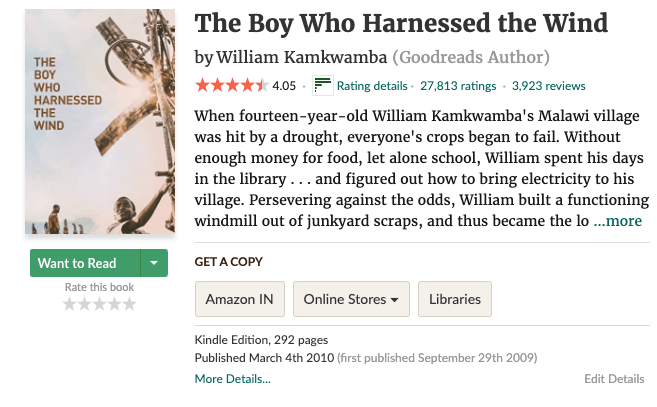
His story later became the book, The Boy Who Harnessed the Wind, and Netflix gave a classical screen.
7. Don’t Feel Behind | Must Remember Lesson in This Range Book Summary
In life, no matter where we are and what kind of job we do have, when we see people getting all the luxurious amenities and making more out of their profession – we feel like we’ve been left behind. Throughout that point, whatever we’ve done and are doing seems pointless.
We compare ourselves to others, and the cycle of self-pity begins. And to this, what David has to say is Don’t Feel Behind. And I believe it’s obvious because we’re not in a race.
Even if you feel like you’re in a race, it’s not against others. Instead, it’s you vs you.
You’ve to compare yourself to yourself. You’ve to improve your present more than your past self. Comparing yourself to others and especially to younger ones is pointless.
They aren’t you. They aren’t in your situation. They don’t have your ideas. And they probably aren’t busy defeating you.
Thus, how does comparison help?
Moreover, just like you, they don’t have an idea where they’re going. Nobody does. Therefore, feeling behind someone is delusional, destructive and patient killing.
And patience is something that’s required more than your experience, regardless of your profession.
8. Nothing Is Wasted – Every Experience Counts
The most challenging thing for a professional in their life is to switch careers. Or even if they’re not switching, it’s harder for them to go after opportunities in which they don’t have any experience. But, progress doesn’t happen this way.
If you’re thinking of switching careers, don’t feel what you’ve done till now is wasted because nothing is.
Andrew Johnson, before becoming the 17th president of the United States, was a tailor.
Whatever you’ve done till now can prove effective in the job you’re about to jump in, whether you’re a shoemaker or laundry cleaner.
Your experience counts in every other field available now or will be in the future.
And this is what this book supports by telling different stories about how generalists in a specialised world can triumph.
To support this, I have a story of mine – a true story, by the way.
9. No Progress When…
Well, one of the best quotes a person should remember when doubting whether they’re progressing in life is, “The only time we stop progressing is when we don’t move.”
The only time we stop progressing is when we don’t move.
Tweet
I don’t know who said this, but it’s entirely true and applicable to everyone regardless of their situation and profession.
When my father died in 2015 at age 55 due to cardiac arrest, he achieved significant success. He was capable of taking risks. Was in the state of buying a luxury car and rebuilding the house we have today.
He educated his three children in above-average schools and so much more.
And to achieve all of these, he had very little when he started his journey. Even more, he failed 10th std (High School) 3 times.
And how did he start? On the farms of our village – I guess he was 22 – 23 then.
Then, he moved to the city and started camel cart work alongside selling milk. He used to supply Cement, Concrete and Sand Mixture on the cart.
And to do this, he had to travel all night from one place to another.
During the day, he used to roam the city to sell fodder and more. Then, in his early 30s, he started selling construction materials like support logs, sand mixture filters etc.

This gave him a slight knowledge of how the construction line works. So, soon in his 35th year, he started setting ceilings. But unfortunately, that didn’t work out.
Hence, he continued the lending work. However, despite his first failure, in his early 40s, he thought of building a house and selling it.
Even though he had little or no money, he managed to buy a plot on loan. Then, the construction started. Finished the house and, after many buyers’ visits, sold it profitability.
And that’s how his breakthrough came when he reached his early 40s.
These all are just a glimpse as I don’t even remember what he would have done to acquire so much knowledge and experience to apply them in different fields.
Although my father has died, he continues to teach me the lessons that we only stop progressing when we don’t move. Because the people he knew, who were doing the same thing he was in his early years, were at the same place they used to be.
Why?
Because they didn’t take risks, they didn’t experiment and didn’t try to leave what they’ve known for years.
And that’s what happens to us when we react like them.
Through all this, the book tries to explain that we can achieve success or, if not success, then gain something contentful in our profession by not only focusing on a single thing instead of trying out so many other paths. It shares a lot of analogies that some of which will definitely touch your domain.
Even though this isn’t a complete summary of the book Range by David Epstein, I believe I have pointed out crucial things that will make your mind to get it right now.
So, don’t wait and add this book to your library. I am certain you’ll learn more lessons I’ve shared here.
But before you go, let’s see who David Epstein is and how he’s a qualified person to teach you all about career, experience and success.
Who’s David Epstein?
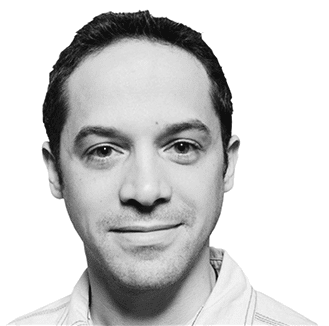
David Epstein, at the time of writing this post, is a 39-42 years old non-fiction writer whose other book, The Sports Gene, was the New York Times bestseller. Earlier, he was a reporter at ProPublica, where he used to get busy with science and investigative.
His books have been translated into over 20 languages. Plus, read by many successful people like President Barack Obama.
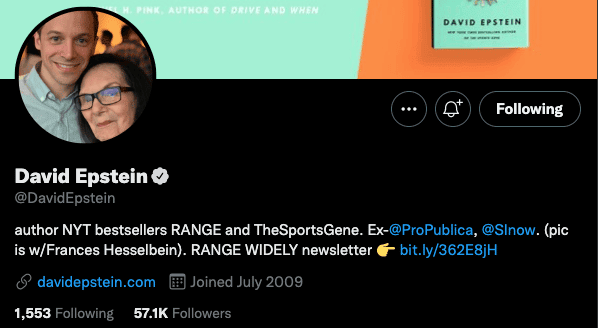
David Epstein’s Twitter is @DavidEpstein. You can reach out to him if something is interesting in your mind. Or to follow what’s new he’s behind.
Where You Can Get the Book, Range – Why Generalists Triumph in a Specialised World
The book Range: Why Generalists Triumph in a Specialised World is available at most offline and online stores. You can visit Amazon, Barnes & Noble or Flipkart to get it now and delivered to your home.
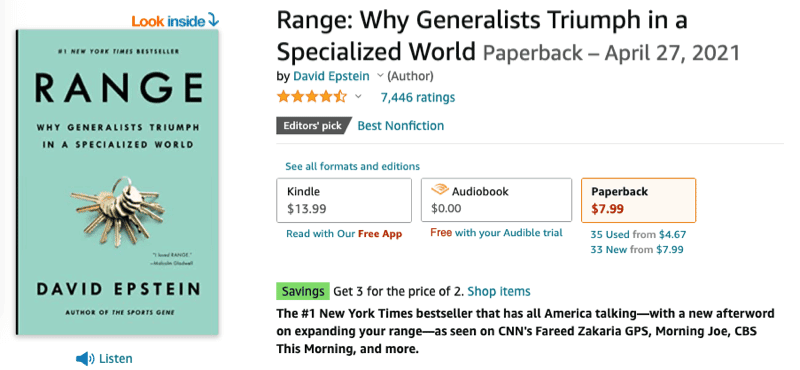
Or you can directly get Range by David Epstein by visiting the official website.
One of the Best David Epstein Range Quotes
Quotes are something you can always expect from books, and this Range book summary will make you aware of what it has for quotes.
- “We learn who we are in practice, not in theory.”
- “If we treated careers more like dating, nobody would settle down so quickly.”
- “Our work preferences and our life preferences do not stay the same, because we do not stay the same.”
- “We fail…tasks we don’t have the guts to quit.”…knowing when to quit is such a strategic advantage that every single person, before undertaking an endeavour, should enumerate conditions under which they should quit.”
- “Seeding the soil for generalists and polymaths who integrate knowledge takes more than money. It takes opportunity.”
-from Range by David Epstein: Why Generalists Triumph in a Specialized World
